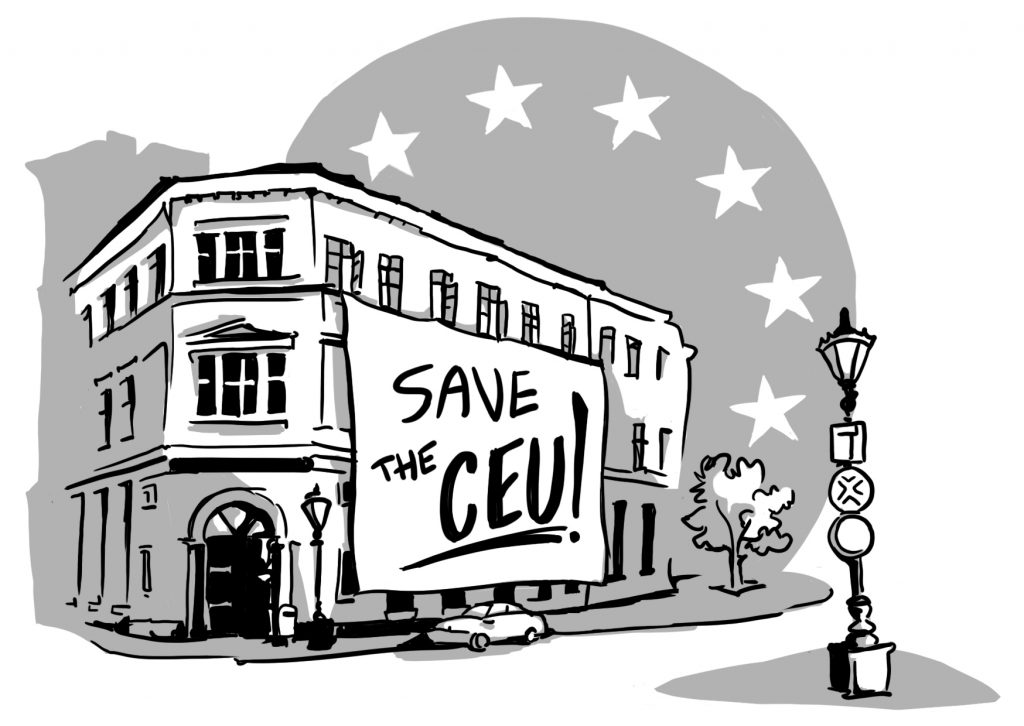Angela-Gabrielle Palmer, an Executive Master of Public Affairs candidate and editor of Digitalisation and Technology at TGP, comments on the situation facing the Central European University in Budapest and outlines how to show solidarity in this troubling time.
In recent weeks, the Central European University (CEU), based in Budapest, has become a hub of activity – but for all the wrong reasons. In early February Figyelő, a well-known Hungarian weekly news publication, produced an article which posed the following question: “Can the Soros School Stay?” The article alleged that the CEU took funding away from other Hungarian institutions to support its activities; that the university discriminated against Hungarian students by offering study places to international students; and that its founding benefactor, George Soros, was seeking to influence Hungarian politics from within the institution.
Figyelő is becoming known as one of many media outlets which are now clearly on the side of the FIDESZ-dominated government, led by Prime Minister Viktor Orbán. Under the circumstances, the direction of such a diatribe against the CEU could be considered part and parcel of the current political situation in Hungary. However, a carefully worded response from the CEU’s Rector and President, Michael Ignatieff, stated that the article implied that the Hungarian government was considering implementing measures against the CEU.
Over a period just shy of 25 years, the CEU has grown to become one of the most prominent institutions for social sciences and humanities in Europe and, to date, is the only Hungarian university to make it into any “top list” of universities. In the fields of Political Science and International Studies, it ranks amongst the top 50 and is home to one of the best business schools in Central and Eastern Europe. Since its inception in 1991, the CEU had maintained a strong professional working relationship with all Hungarian governments, even with the current administration. It expected that this relationship would continue to progress without incident.
However, it appears that not even this is enough to save the institution from the scrutiny and pressure of the right-wing government led by Orbán. The hopes of the CEU administrators and its student body have ultimately proven to be futile. On 29 March 2017, the Hungarian Minister for Human Resources, Zoltán Balog, proposed amendments to the National Higher Education Law that would make it virtually impossible for the CEU to continue to operate in Hungary. Under the provisions of the new legislation, “foreign universities” are only allowed to operate in Hungary and grant diplomas if the University’s country of origin and Hungarian government conclude a state contract, and the relevant institution also maintains a campus in its country of origin.
The CEU is the only institution based in Hungary for which the second condition applies. It offers degrees which are accredited both in Hungary and New York State, but it has no US-based campus. Further proposed restrictions are also likely to have an adverse impact on the CEU, as foreign academics will now lose an exemption provision that had allowed them to work without a formal permit. In a statement on the new measures, the Human Resources Minister claims that the amendment was needed after a government probe “found violations and shortfalls at a majority of foreign educational institutions operating in Hungary.” As the proposed laws will only affect a single educational institution, it is more than apparent that the CEU is being deliberately targeted by Orbán’s administration.
In many respects, the CEU is an anomaly in the current political and cultural environment in Hungary. It has long prided itself on being a fully inclusive institution with a highly diverse international student body. This stands in direct contrast to Hungary today, whose government is actively pursuing the establishment of an “illiberal democracy” in the heart of Europe. In recent years, any opposition to the government, whether speculative or genuine, has become subject to harsh official interference. The activities of NGOs operating in Hungary, such as Transparency International, the Helsinki Committee and Ökotárs Foundation, are now subject to stringent government monitoring. The government justifies its actions by stating that this is to counter foreign interference in domestic politics. The reality is much starker, as this is the government’s attempt to fully consolidate its position at the centre of life in Hungary. Consequently, liberal democratic values and the rule of law are quickly becoming a thing of the past.
Some press commentators have reduced this issue to one with the hallmarks of an ideological standoff between Orbán and Soros. Soros is a well-known and frequently quoted critic of Orbán’s policies, and as a result has effectively become persona non grata in the eyes of the government and its supporters. The fact is, however, that this dispute runs much, much deeper. The attack on the CEU is another step in Orban’s campaign to sideline the last remaining remnants of a fragile liberal democratic society in Hungary. For this reason, as an institution which seeks to educate its students in this intellectual tradition and to embody these principles, the CEU is now being pursued.
For students of the CEU, the immediate future is uncertain. At a community forum held on March 29, Michael Ignatieff assured all students, staff and faculty members that the university was committed to ensuring that the CEU would continue to exist in its current state at its home campus. Ignatieff assured students and staff that “the university will not stop operating for one second … not by anybody, under any circumstances.” Whilst students were advised to continue to pursue their studies, attend classes and take part in the social life of the campus, Ignatieff also appealed to them for their help in meeting the challenges that will ultimately lie ahead. All CEU members have been called on to mobilise support to petition the government, to draw support from all quarters to ensure that the institution would continue to operate in its current state, unhindered by government interference.
In a world where populism is gaining greater credence and liberal democratic values, including freedom of expression, are under threat, the importance of ensuring that institutions such as the CEU can continue to operate is without dispute. For those of us who look at what is happening in Hungary with growing unease, the fate of the CEU is one which may one day be visited on many other higher education institutions. Under these circumstances, there is a moral obligation to address these issues and show our solidarity with the CEU. For this reason, by standing with the CEU, we shall preserve not only academic freedom but also the fundamental values of an open society.
This is a pivotal time in the life of the CEU, and the time is right for us to now show our solidarity with the students, staff and faculty members of this institution. For anyone who is interested in supporting the CEU campaign, we encourage you to:
- Write a letter to the Hungarian Minister of Human Resources. The CEU has already provided a form letter which you can send in either English or Hungarian
- Show your solidarity on social media by using #istandwithCEU and using the #istandwithCEU profile picture found on the CEU Facebook page
- Send campaign suggestions or notices of support to: Support_for_CEU@ceu.edu
- Sign the Change.org petition
#IstandwithCEU
#aCEUvalvagzok
Angela-Gabrielle Palmer is a Second Year Executive Master of Public Affairs candidate at the Hertie School of Governance.

